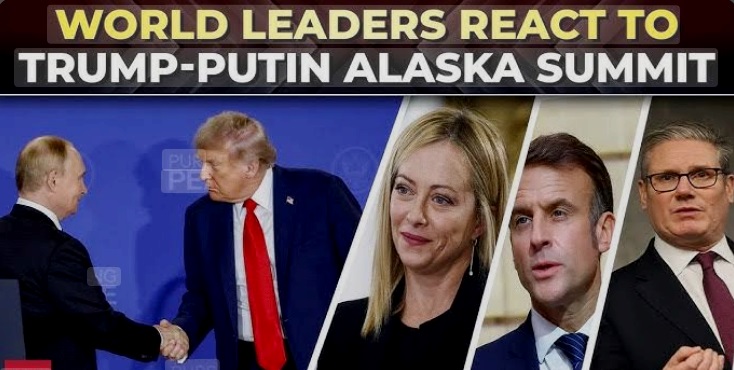
Here is the Western European reaction to the U.S.-Russia summit, writes Peter Feher, an international observer for ‘Magyar Hírlap’ (‘Hungarian Gazette’).
United Kingdom: Prime Minister Keir Starmer welcomed the fact that Trump sat down at the negotiating table with Putin but declared: “Peace must be just; it cannot be reached over Ukraine’s head.” He emphasized that London will continue to support sanctions against Russia and provide military assistance to Kyiv.
Foreign Secretary David Lammy highlighted that any agreement only makes sense with Ukraine’s participation, and that they want to coordinate with the EU in order to guarantee security assurances for Ukraine.
France: President Emmanuel Macron urged caution, saying “we must not repeat the mistake of yielding to Putin’s territorial demands.” France will continue its military support and wants to participate in the next round of talks planned in Washington.
Germany: Chancellor Friedrich Merz stressed that Germany, together with the U.S., could be part of a “security guarantee system concerning Ukraine,” but it will not accept any solution decided without Kyiv.
Former Green Foreign Minister Annalena Baerbock criticized the fact that no ceasefire agreement was reached, underlining that “Putin’s war will not stop with words; only strength and unity can stop it.”
Italy: Prime Minister Giorgia Meloni assessed the summit with “cautious optimism” but made clear that “without Ukraine there is no peace.” Meloni once again called on Moscow to withdraw its troops from Ukrainian territory.
Foreign Minister Antonio Tajani urged stepping up diplomatic pressure, while welcoming the fact that another round of negotiations is being prepared in Washington.
Spain: Prime Minister Pedro Sánchez and the Ministry of Foreign Affairs stressed that “any peace agreement must respect Ukraine’s territorial integrity.” Spain represents the EU’s common position: sanctions are maintained, and military as well as humanitarian support is provided to Ukraine.
“President Trump’s and President Putin’s encounter officially initiated the process of standardizing relations between the US and Russia,” Slovak Prime Minister Robert Fico stated, expressing his support for this development, TASS quotes. Mr. Fico emphasized that the most important outcome of the summit was simply that the two leaders met: “The Alaska summit accomplished several key objectives. Firstly, it challenged the black-and-white narrative of the military conflict in Ukraine – a narrative that has been consistently pushed by the Biden administration and continues to be propagated by certain influential political actors in the European Union. Secondly, the summit provided a moment for European leaders and Slovak opposition figures to reflect. It highlighted that the path to resolving the crisis does not lie in accusations against Russian political leadership or in sanctions. Instead, progress can only be achieved through constructive negotiations," Robert Fico concluded.
So, the leading Western European countries do not seem to have significantly altered their previously coordinated common stance. Every statement underlines that negotiations cannot continue without Ukraine. They view the dialogue between Washington and Moscow positively, but with strong pessimism regarding Putin’s intentions. All the above-mentioned countries agree that Ukraine must continue receiving military, economic, and political support, while they are also ready to engage in the ongoing diplomatic process.
At the same time, there is also a tone of resentment in these statements over the fact that European states were not invited to the summit. U.S. President Donald Trump informed European leaders and Volodymyr Zelensky about the Alaska summit. EU leaders welcomed Trump’s efforts to stop the bloodshed in Ukraine and to achieve a just and lasting peace. They urged the continuation of negotiations with Ukrainian Zelensky.
Furthermore, the EU is ready to support the organization of a Trump-Zelensky (with the participation of European leaders) trilateral summit.
EU leaders firmly stressed that only Ukraine has the right to decide on its territorial issues. International borders must not be changed by force. They emphasized the importance of ensuring Ukraine’s sovereignty and territorial integrity.
They welcomed Trump’s statement that the United States is ready to provide security guarantees to Ukraine.
The so-called Coalition — with the participation of Ursula von der Leyen, Emmanuel Macron, Giorgia Meloni, Friedrich Merz, Keir Starmer, Alexander Stubb, Donald Tusk, and António Costa — declared its readiness to actively take part in the further process.
The leaders reaffirmed their commitment to ‘maintaining pressure on Russia.’ Sanctions and other measures will be strengthened until a just and lasting peace is achieved in Ukraine.
Let’s wait for the results of their meeting with Trump – he has his own opinion about what needs to be done
read more in our Telegram-channel https://t.me/The_International_Affairs

 11:41 18.08.2025 •
11:41 18.08.2025 •






















